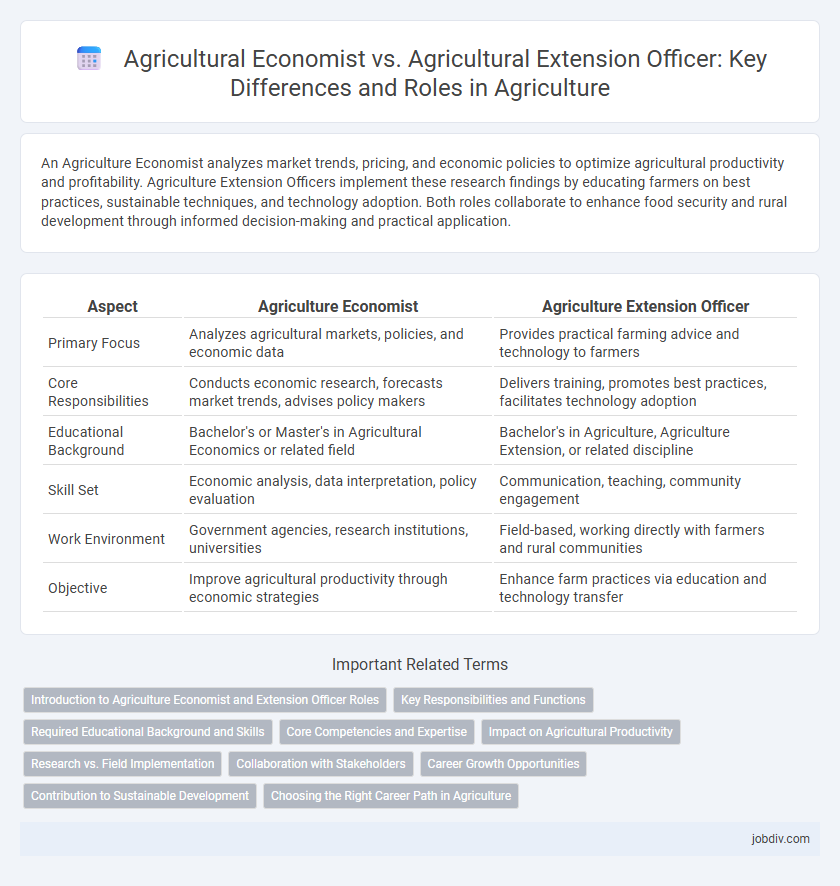An Agriculture Economist analyzes market trends, pricing, and economic policies to optimize agricultural productivity and profitability. Agriculture Extension Officers implement these research findings by educating farmers on best practices, sustainable techniques, and technology adoption. Both roles collaborate to enhance food security and rural development through informed decision-making and practical application.
Table of Comparison
| Aspect | Agriculture Economist | Agriculture Extension Officer |
|---|---|---|
| Primary Focus | Analyzes agricultural markets, policies, and economic data | Provides practical farming advice and technology to farmers |
| Core Responsibilities | Conducts economic research, forecasts market trends, advises policy makers | Delivers training, promotes best practices, facilitates technology adoption |
| Educational Background | Bachelor's or Master's in Agricultural Economics or related field | Bachelor's in Agriculture, Agriculture Extension, or related discipline |
| Skill Set | Economic analysis, data interpretation, policy evaluation | Communication, teaching, community engagement |
| Work Environment | Government agencies, research institutions, universities | Field-based, working directly with farmers and rural communities |
| Objective | Improve agricultural productivity through economic strategies | Enhance farm practices via education and technology transfer |
Introduction to Agriculture Economist and Extension Officer Roles
Agriculture economists analyze market trends, production costs, and policy impacts to improve agricultural efficiency and profitability, applying economic principles to farming systems and rural development. Agriculture extension officers provide farmers with practical training, technology transfer, and resources to implement best agricultural practices, focusing on increasing productivity and sustainability at the grassroots level. Both roles are essential for bridging the gap between agricultural science, market dynamics, and on-field application to foster sector growth.
Key Responsibilities and Functions
An Agriculture Economist analyzes agricultural markets, evaluates economic policies, and forecasts trends to optimize resource allocation and improve farm profitability. An Agriculture Extension Officer focuses on disseminating practical knowledge, training farmers in modern techniques, and promoting sustainable agricultural practices to enhance productivity. Both roles are crucial in bridging economic research and field-level implementation for agricultural development.
Required Educational Background and Skills
Agriculture Economists require a strong foundation in economics, statistics, and agricultural sciences, typically holding a degree in agricultural economics or related fields, with advanced skills in data analysis, economic modeling, and policy evaluation. Agriculture Extension Officers usually possess degrees in agriculture, agronomy, or agricultural education, emphasizing practical knowledge, communication skills, and expertise in farm management, technology transfer, and community engagement. Both professions demand proficiency in problem-solving, but Agriculture Economists focus more on theoretical and quantitative skills, while Extension Officers excel in applied, interpersonal, and instructional abilities.
Core Competencies and Expertise
Agriculture Economists specialize in analyzing market trends, policy impacts, and economic data to optimize agricultural productivity and profitability, leveraging skills in statistical analysis, econometrics, and resource management. Agriculture Extension Officers focus on practical knowledge transfer and community engagement, applying expertise in agronomy, pest management, and sustainable farming techniques to educate farmers and improve field-level practices. Both roles require strong communication skills, but economists prioritize data-driven decision-making while extension officers emphasize hands-on advisory services and farmer capacity building.
Impact on Agricultural Productivity
Agriculture economists analyze market trends, resource allocation, and economic policies to maximize farm profitability and sustainable agricultural productivity. Agriculture extension officers directly engage with farmers through training, technology transfer, and hands-on support, enhancing practical adoption of innovations and improving crop yields. The combined efforts of economists' strategic insights and extension officers' field-level implementation significantly boost overall agricultural productivity and rural livelihood.
Research vs. Field Implementation
Agriculture Economists analyze market trends, resource allocation, and economic policies to optimize agricultural productivity and profitability through data-driven research. Agriculture Extension Officers implement research findings directly in the field by educating farmers, promoting sustainable practices, and facilitating technology adoption to enhance crop yield and livelihoods. The distinction lies in economists focusing on theoretical and empirical economic analysis, while extension officers emphasize practical application and farmer engagement.
Collaboration with Stakeholders
Agriculture economists collaborate with stakeholders by analyzing market trends and policy impacts to provide data-driven recommendations for sustainable agricultural practices. Agriculture extension officers work closely with farmers, local communities, and government agencies to implement these recommendations through education and on-ground technical support. Effective collaboration between these roles enhances decision-making processes, ensuring practical solutions that improve productivity and rural livelihoods.
Career Growth Opportunities
Agriculture Economists analyze market trends, policy impacts, and resource allocation to guide decision-making, offering career growth through roles in government agencies, research institutions, and international organizations. Agriculture Extension Officers specialize in field-based education and technology transfer to farmers, with career advancement typically found within agricultural departments, NGOs, and community development programs. Both careers provide strong growth potential, but Agriculture Economists often have broader opportunities in policy formulation and economic analysis, while Extension Officers excel in grassroots-level agricultural development and farmer engagement.
Contribution to Sustainable Development
Agriculture economists analyze market trends and policy impacts to promote efficient resource allocation and financial sustainability within the agricultural sector, directly supporting sustainable development goals. Agriculture extension officers facilitate knowledge transfer of sustainable farming practices and innovations to farmers, enhancing productivity and environmental stewardship at the grassroots level. Both roles synergistically contribute to sustainable development by balancing economic viability with ecological conservation in agriculture.
Choosing the Right Career Path in Agriculture
Agriculture economists analyze market trends, agricultural policies, and economic data to improve farm profitability and resource management, making them ideal for those interested in data analysis and policy development. Agriculture extension officers work directly with farmers, providing practical advice, training, and support to enhance crop production and sustainable practices, suited for individuals passionate about community engagement and hands-on agricultural development. Selecting the right career path depends on whether one prefers economic research and strategy or field-oriented agricultural support and education.
Agriculture Economist vs Agriculture Extension Officer Infographic

 jobdiv.com
jobdiv.com